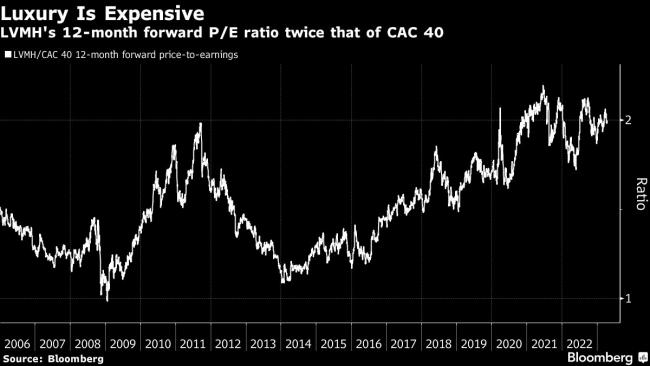(Bloomberg) -- LVMH’s market value surpassed $500 billion, becoming the first European company to reach that milestone, thanks to booming sales of luxury goods in China and a strengthening euro.
The achievement comes less than two weeks after LVMH (EPA:LVMH) joined the ranks of the world’s 10 biggest companies, powered by a surge in first-quarter sales. Rival Hermes International (OTC:HESAF) subsequently published its own strong numbers, reinforcing the view that China’s reopening from pandemic lockdowns is fueling growth across the industry.
The company’s rising value has swelled the wealth of the world’s richest person, Bernard Arnault, who built LVMH into a global powerhouse through a series of acquisitions. His fortune stands at almost $212 billion, according to the Bloomberg Billionaires Index.
Shares of Paris-based LVMH (OTC:LVMUY), as the company is formally known, climbed 0.3% to €903.70 at 10:43 a.m. Monday, valuing the company at €454 billion ($500 billion).
LVMH and its French luxury rivals are to the European stock market what Big Tech has been to the US: Dominant businesses whose growth holds up even as the economy waxes and wanes. That’s evident in the global market value rankings, with a host of technology companies dominating the list, where LVMH has become the latest entrant taking 10th place.
“Luxury stocks embody what the equity market has best to offer at the moment: exposure to Chinese consumption, which continues to surprise on the rise, and robust margins thanks to their pricing power,” said Lilia Peytavin, European portfolio strategist at Goldman Sachs in Paris. “This differentiates Luxury from Tech, whose margins have been contracting for several quarters already.”
Demand has held up for LVMH products — Louis Vuitton handbags, Moet & Chandon Champagne and Christian Dior gowns among them — even as surging inflation and rising interest rates have threatened to tip the world into recession.
LVMH did caution this month that it’s seeing a slowdown in US growth, with demand for cognac and leather goods particularly affected, and some investors fret that the stock inevitably will be hurt should the economic slowdown worsen.
For now, paradoxically, concern about a recession is lifting LVMH’s value in dollar terms. The euro this month jumped to its highest level in more than a year as the dollar slumped, fueled by increasing market expectations that a worsening US economy will prompt the Federal Reserve to cut interest rates this year.
Analysts have been raising their targets on LVMH’s stock amid the steep run higher. They see room for further gains, as 30 out of the 36 analysts tracked by Bloomberg have a buy-equivalent rating.
Bank of America.’s Ashley Wallace sees the stock hitting €1,000 in the next year. “LVMH is too cheap given the attractiveness of the luxury goods sector, its strong portfolio of brands and best-in-class execution,” Wallace wrote in a report April 13.
The $500 billion milestone was decades in the making.
Arnault, LVMH’s chairman and chief executive officer, made his foray into luxury in 1984, taking over Boussac Saint-Freres, the bankrupt textile group that owned a gem: Christian Dior. He spun off most of the company’s other businesses and used the windfall to buy a controlling stake in LVMH, whose two main companies, Louis Vuitton and Moet Hennessy, had merged in 1987.
Over the next three decades — and through dozens of acquisitions — he built LVMH into a luxury behemoth selling everything from spirits to leather goods to jewelry through more than 5,600 stores worldwide. He was quick to grasp that China would become a key market, opening the first Louis Vuitton store in Beijing in 1992.
Arnault, 74, and his family own 48% of LVMH’s share capital, and he’s been laying the groundwork to keep the company under family control for decades to come.
The sprawling conglomerate, with its 75 labels ranging from Dom Perignon to Givenchy and Tiffany & Co (NYSE:TIF)., became a training ground for ambitious designers seeking to make a name for themselves: Marc Jacobs and the late Virgil Abloh at Louis Vuitton, Raf Simons at Christian Dior and Phoebe Philo at Celine. All infused the brands with novelty that kept them relevant to young consumers.
In February, Louis Vuitton named musician and apparel entrepreneur Pharrell Williams as the label’s menswear designer, filling the role previously held by Abloh, who died in 2021. Williams will unveil his first collection in June during Paris Fashion Week.
More recently, Arnault has come under fire over possible meddling in his media holdings.
French Resentment
The strong performance of LVMH has propelled his fortune higher, making him the world’s wealthiest person, ahead of Elon Musk and Jeff Bezos.
But it’s also prompted resentment in his home country. On April 13, protesters briefly stormed the headquarters of LVMH on the posh Avenue Montaigne. Union members voiced their anger against President Emmanuel Macron’s plans to raise the minimum retirement age, urging that any shortfall in the pension system should be made up by increasing taxes on businesses like the luxury behemoth.
There’s no sign Arnault intends to step down any time soon. LVMH last year lifted the age limit of its chief executive officer, which would allow him to stay at the helm until 80. The titan has started to lay the groundwork for his succession, though, through a new holding company.
